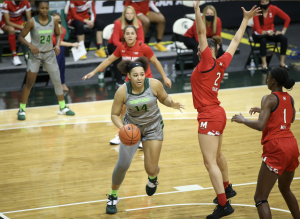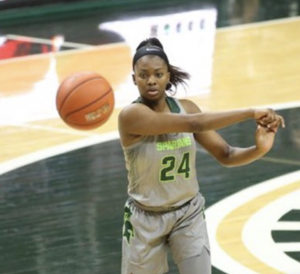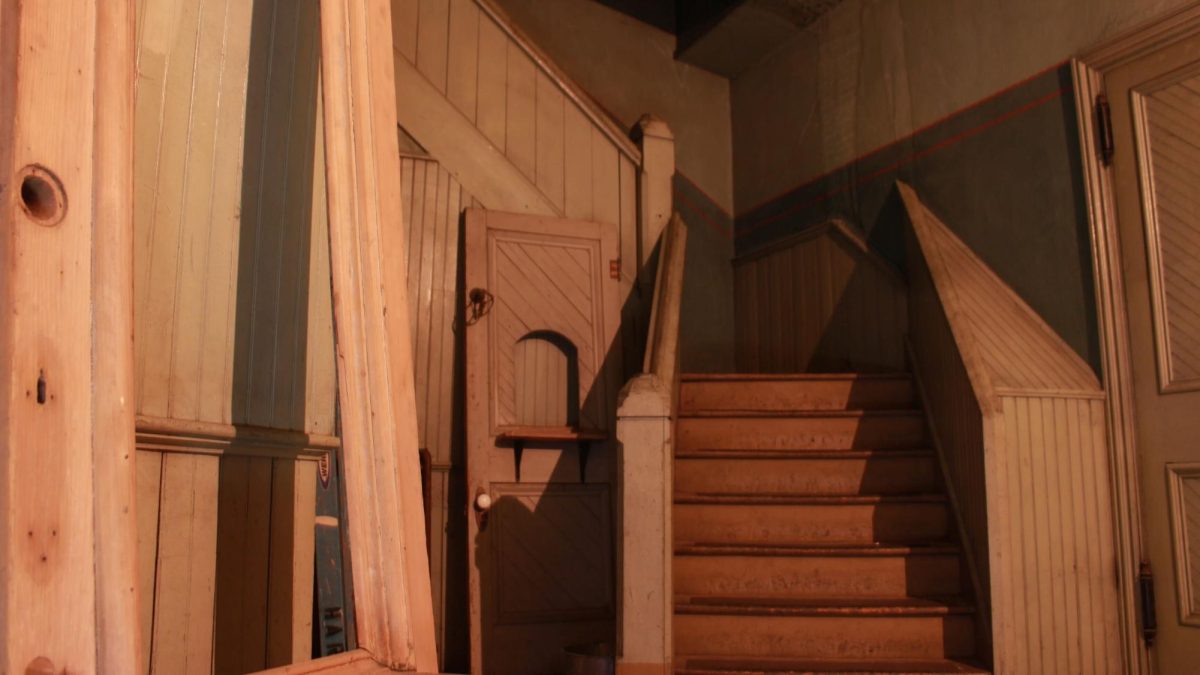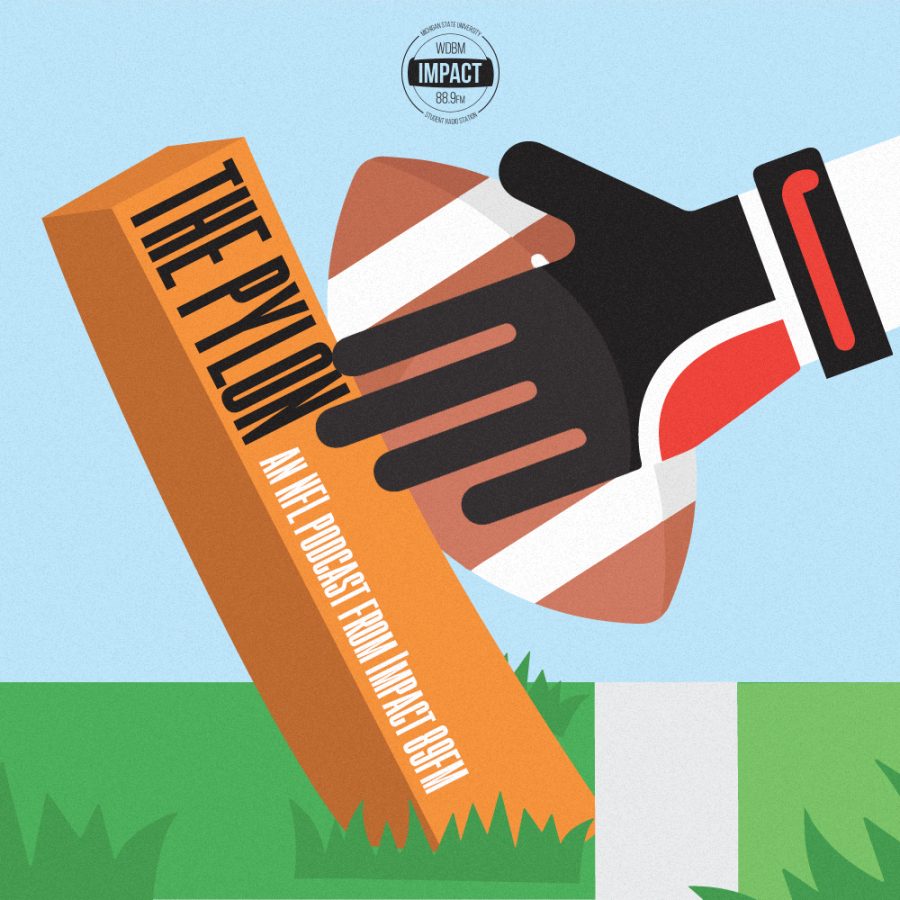Three B1G Things: A Rivalry Renewed
January 15, 2021
EAST LANSING — The Michigan State Spartans and the No. 9 Michigan Wolverines restored their decade-long rivalry this past weekend in a home-and-away series.
Michigan State (4-4-2 overall, 3-4-1-2 Big Ten) was looking to keep its recent form of gaining at least one win from each of their previous three series since getting swept by Minnesota in early December.
However, the Spartans had a tough task ahead of them as they faced the No. 9 Michigan Wolverines (5-5 overall, 3-5-0-1 Big Ten) which boasts the nation’s top recruiting class and features the return of two IIHF World Junior gold medal winners into their lineup.
The Spartans and the Wolverines battled to a surprising series split with MSU stealing a game two victory in the game’s final minute of action. Here are Three B1G Things from the Spartans clash against Michigan.
Game one
Since the beginning of December, the Spartans have not done well at getting their legs going or doing much of anything in that matter in the first period. This would come to haunt them as the Wolverines pounced on them early and chased junior goaltender Drew DeRidder from the game with just under half of the first period left to play.
DeRidder was replaced by freshman Pierce Charleson after giving up three goals on nine shots. If there is one thing the Spartans could take away from game one, it would be Charleson’s surprise appearance.
Charleson, a native of Aurora, Ontario, had been recruited by Michigan State from the Brooks Bandits in the AJHL. With the Bandits, Charleson put up a .901 save percentage and had a goals against average of 2.42 in two years.
His most impressive stat from his time in the development leagues was his 42-2 record in the 2018-19 season with Brooks, leading them to the 2019 AJHL championship and Centennial Cup.
Charleson’s impressive stats in the Canadian leagues would not do him much in game one, as he surrendered another six goals to the Wolverines while amassing 29 saves in his debut. Though that statline is not appetizing to most, Charleson was thrown into a bad situation against a team that can really light the lamp when it wants.
To shoulder the blame a little more, both DeRidder and Charleson did not get much help in front of them. DeRidder faced just as many shots in 11 minutes of play as Michigan goaltender Strauss Mann faced in the first two periods.
Even more preposterous is that when DeRidder got pulled, the Spartans still continued leaving their goalie out to dry and forced Charleson to get acclimated quickly.
The Wolverines took game one in Ann Arbor by a lofty score of 9-0 and made the hour long drive back to Munn Ice Arena a gloomy one for the Spartans.
Grit
A true testament to a team’s heart is how they respond to adversity. Well, game two would provide such an opportunity for the Spartans, and they were sure to make it count.
Historically speaking, the team in this rivalry that has scored first has won five out of the previous six matchups (six out of seven heading into game two). This stat, combined with the recent slow starts for the Spartans, should have made for an equally disastrous game two in East Lansing.
But it didn’t.
The Spartans came storming out of the gates in East Lansing and there was a man who was the catalyst to this surprising resurgence: Tommy Apap.
Apap, who missed game one, was reinserted into the lineup and gave the Spartans a clean slate and a newfound confidence. This would show on the opening faceoff, when after a Spartan win, cheers could be heard on the Spartan bench.
Those cheers would grow even louder as Charlie Combs scored just 54 seconds into the game to give the Spartans a surprising 1-0 lead.
Along with Apap returning to the lineup, Danton Cole elected to start DeRidder after pulling him in game one for Charleson. DeRidder would not make the same mistakes he did in game one, and stopped 15 out of 16 Wolverine shots in the first period.
After a scoreless second period, the Spartans had a chance to win game two and looked like they could after matching up Michigan well in the first two periods.
This synopsis sounds like it should have a happy ending right? Well, it almost didn’t.
With the score being tied 1-1 coming out of second intermission, the floodgates opened and MSU faced a determined Michigan team that was dead set on sweeping the series.
After letting in three goals on nine shots in game one, DeRidder stepped up and sent away 13 Michigan shots in the third, but with just under five minutes to play, the Wolverines looked to put the nail in the Spartan coffin when Brendan Brisson scored his third goal of the year to give Michigan the lead.
However, the Spartans decided they weren’t going to lose, and they weren’t going to tie either. Cole Krygier put a one-timer past Mann with just over two minutes left to play, and with 37 seconds remaining, Josh Nodler scored his first goal of the year by barely sneaking a shot by an outstretched Mann to give the Spartans the lead and the eventual game two victory.
Game two showed that Michigan State can indeed hold their own against a top team, and that a Spartan team with young talent can find confidence in their game and steal some games along the way.
First, second and third
Nodler’s game-winning goal in game two was also his first goal of the season. In Nodler’s six prior appearances against the Wolverines he had two points, including a goal in Michigan State’s early-season sweep during the 2019-20 campaign.
Nodler’s game-winner was also the first time the forward had scored since a tie against Notre Dame on Feb. 29, 2020.
Another first for Michigan State is its Big Ten penalty minute per game average. The Spartans rank first with almost 12 minutes of penalties per game. The Spartans will most likely continue holding that rank after committing 22 penalty minutes during their series against Michigan, including 14 penalty minutes in a frustrating 9-0 loss in game one.
On a more positive note, the Spartans rank second in the Big Ten in penalty kill at 82%. The Spartans gave up two power play goals to the Wolverines over the weekend, but have severely lowered the number of goals they have given up shorthanded in recent games.
In their past six games, the Spartans have surrendered three power play goals on 20 opposing power plays, averaging to an 85% successful kill rate.
Lastly, the Spartans earned their third win of the season when scoring first. Last season, Cole’s side had amassed an 11-3-2 record when scoring first, and this season, the spartans have looked to continue that trend by going 3-0-2 so far.
The Spartans game two victory also gave them their third win against a ranked opponent this year. The Spartans went 6-9-1 against ranked teams last season and are now 3-4-1 this year.
The conclusion of the Michigan series means that the Spartans have now gone three straight series (six games) without eclipsing the 30 shots on goal mark. The Spartans started the season off with three straight games with more than 40 shots on goal and have since seen their shots per game average dwindle to under 29 per game.
The Spartans (5-5-2 overall, 4-5-1-2 Big Ten) will travel to Happy Valley to take on Penn State (5-7 overall, 3-7 Big Ten) for the second time in under two weeks, completing their season series against the Nittany Lions on Jan. 15 and 16.
Follow Cam McClarren on Twitter @Cam_McClarren.


































